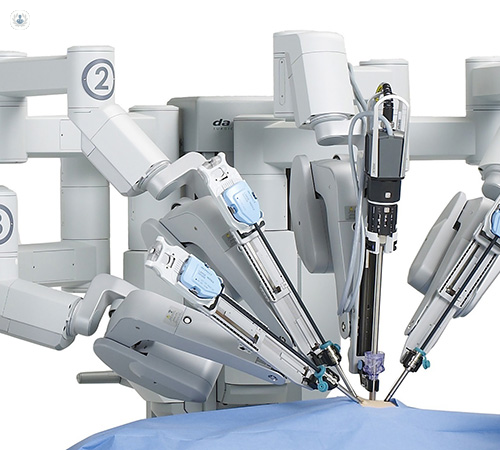What is robotic surgery in urology?
Robotic surgery is a type of minimally invasive surgery which makes use of miniaturised surgical instruments guided by an advanced robot. It is a very advanced technique that allows the surgeon to perform surgical procedures in a very precise manner. This type of surgery is usually done under general anaesthesia.
The advantages of robotic surgery over traditional open surgery are related to the fact that there are smaller, more precise incisions, which translate into quicker recovery and less pain.
Moreover, higher precision means that urinary continence and erectile function are less likely to be compromised with robotic surgery than with other surgical techniques.

Why is it done?
More and more surgical treatments are becoming amenable to robotic surgery, due to the advantages it provides for the patient and the surgeon. Robotic surgery in urology is used in the treatment of prostate cancer (prostatectomy), kidney cancer (nephrectomy), bladder cancer, genital prolapse, urethral stenosis, and other pathologies.
What does it involve?
Robotic surgery is performed using specialised robots, such as the well-known da Vinci robot. Surgical instruments are fixed to the arms of the da Vinci robot and are manipulated remotely by the surgeon from a workstation, i.e. he does not have to be physically present in the operating theatre.
The robot reproduces the surgeon’s movements and eliminates the shakiness associated with human hands; moreover, manipulations impossible for humans, such as rotating surgical instruments 360º, are possible with the aid of a robot.
The surgeon visualises the procedure on a monitor with a stereoscopic visual system with 3D vision that allows them to perceive depth. The monitor image can also be enlarged.
How should I prepare for robotic surgery?
Even though robotic surgery is a minimally invasive technique, it is still possible that you may not be able to undergo a given intervention. Hence, certain medical tests as requested by your doctor and a review of your medical history are important in order to determine your health status.
It is also probable, depending on the surgery to be performed, that you may have to fast for several hours before the intervention.
What is recovery time like?
One of the main advantages of robotic surgery versus conventional open surgery is the rapid recovery. In many cases, patients are discharged on the same day as the intervention. In other cases, patients may remain hospitalised for around 24 hours. Generally speaking however, there is no particular postoperative care beyond the painkilling medication prescribed by the urologist.
What are the alternatives to robotic surgery in urology?
Robotic surgery entails a sizeable investment in equipment and in specific training for surgeons. For these reasons, it is not available at all medical centres. As alternatives, urological surgical procedures may be performed using conventional open surgery or ideally using minimally invasive techniques such as endoscopy or urological laparoscopy.
11-13-2012 07-19-2023Robotic surgery in urology
What is robotic surgery in urology?
Robotic surgery is a type of minimally invasive surgery which makes use of miniaturised surgical instruments guided by an advanced robot. It is a very advanced technique that allows the surgeon to perform surgical procedures in a very precise manner. This type of surgery is usually done under general anaesthesia.
The advantages of robotic surgery over traditional open surgery are related to the fact that there are smaller, more precise incisions, which translate into quicker recovery and less pain.
Moreover, higher precision means that urinary continence and erectile function are less likely to be compromised with robotic surgery than with other surgical techniques.

Why is it done?
More and more surgical treatments are becoming amenable to robotic surgery, due to the advantages it provides for the patient and the surgeon. Robotic surgery in urology is used in the treatment of prostate cancer (prostatectomy), kidney cancer (nephrectomy), bladder cancer, genital prolapse, urethral stenosis, and other pathologies.
What does it involve?
Robotic surgery is performed using specialised robots, such as the well-known da Vinci robot. Surgical instruments are fixed to the arms of the da Vinci robot and are manipulated remotely by the surgeon from a workstation, i.e. he does not have to be physically present in the operating theatre.
The robot reproduces the surgeon’s movements and eliminates the shakiness associated with human hands; moreover, manipulations impossible for humans, such as rotating surgical instruments 360º, are possible with the aid of a robot.
The surgeon visualises the procedure on a monitor with a stereoscopic visual system with 3D vision that allows them to perceive depth. The monitor image can also be enlarged.
How should I prepare for robotic surgery?
Even though robotic surgery is a minimally invasive technique, it is still possible that you may not be able to undergo a given intervention. Hence, certain medical tests as requested by your doctor and a review of your medical history are important in order to determine your health status.
It is also probable, depending on the surgery to be performed, that you may have to fast for several hours before the intervention.
What is recovery time like?
One of the main advantages of robotic surgery versus conventional open surgery is the rapid recovery. In many cases, patients are discharged on the same day as the intervention. In other cases, patients may remain hospitalised for around 24 hours. Generally speaking however, there is no particular postoperative care beyond the painkilling medication prescribed by the urologist.
What are the alternatives to robotic surgery in urology?
Robotic surgery entails a sizeable investment in equipment and in specific training for surgeons. For these reasons, it is not available at all medical centres. As alternatives, urological surgical procedures may be performed using conventional open surgery or ideally using minimally invasive techniques such as endoscopy or urological laparoscopy.


Sexual function after RARP: part 1
By Mr Benjamin Lamb
2025-01-15
Prostate cancer creates a huge amount of stress for men, and many are concerned about the effects of robotic assisted radical prostatectomy (RARP) on their sexual function. We speak to experienced consultant urological and robotic surgeon Mr Benjamin Lamb who clears up any concerns you may have. See more


Robotic surgery in urology: an expert's guide
By Mr Ashwin Sridhar
2025-01-15
Robotic surgery is a new technique that greatly improves the outcome of surgical procedures. In his latest online article, consultant urologist and robotic prostate and bladder cancer surgeon Mr Ashwin Sridhar explains everything you need to know about robotic surgery in urology. See more


Robotic Prostatectomy (prostate removal): All you need to know
By Mr Wissam Abou-Chedid
2025-01-14
Mr Wissam Abou-Chedid, leading consultant urological surgeon, explains all about Retzius-sparing Prostatectomy, an innovative robotic technique for prostate cancer treatment. See more


Robotic-assisted radical prostatectomy: what you need to know
By Mr Aidan Noon
2025-01-14
Robotic-assisted radical prostatectomy is a minimally invasive surgery to remove the prostate gland and some surrounding tissue, using robotic technology. The surgeon controls robotic arms equipped with surgical instruments, providing precision, smaller incisions, reduced blood loss, and quicker recovery compared to traditional open surgery. Distinguished consultant urologist Mr Aidan Noon provides an insight into the treatment, including an explanation of the approach he uses in his practice. See more
Experts in Robotic surgery in urology
-
Mr Christopher Anderson
UrologyExpert in:
- Kidney cancer
- Prostate cancer
- Laparoscopy
- Robotic surgery in urology
- Prostatectomy (prostate removal)
- Prostate biopsy
-
Mr Neil Barber
UrologyExpert in:
- Prostate
- Prostate cancer
- Kidney cancer
- Green light laser surgery
- Robotic surgery in urology
- Benign prostate enlargement
-
Mr Rick Popert
UrologyExpert in:
- Robotic surgery in urology
- Holmium laser (HoLEP)
- Prostate cancer
- Prostate biopsy
- Brachytherapy
- Benign prostate enlargement
-
Mr Aniruddha Chakravarti
UrologyExpert in:
- Robotic surgery in urology
- Holmium laser (HoLEP)
- Benign Prostate Tumors
- Kidney stones
- Laparoscopy
- UroLift®
-
Mr Tim Dudderidge
UrologyExpert in:
- Prostate cancer
- Prostatectomy (prostate removal)
- Benign prostate enlargement
- Robotic surgery in urology
- Cryotherapy for prostate and kidney cancer
- Prostate biopsy
- See all

108 Harley Street Medical
108 Harley Street Medical
108 Harley Street, W1G 7ET
No existe teléfono en el centro.
By using the telephone number provided by TOP DOCTORS, you automatically agree to let us use your phone number for statistical and commercial purposes. For further information, read our Privacy Policy
Top Doctors

OneWelbeck Men's Health
OneWelbeck Men's Health
1 Welbeck St, London, W1G 0AR
No existe teléfono en el centro.
By using the telephone number provided by TOP DOCTORS, you automatically agree to let us use your phone number for statistical and commercial purposes. For further information, read our Privacy Policy
Top Doctors

Guy’s and St Thomas’ Private Healthcare
Guy’s and St Thomas’ Private Healthcare
Guy’s Hospital, Great Maze Pond
No existe teléfono en el centro.
By using the telephone number provided by TOP DOCTORS, you automatically agree to let us use your phone number for statistical and commercial purposes. For further information, read our Privacy Policy
Top Doctors
-
108 Harley Street Medical
108 Harley Street, W1G 7ET, W1G Marylebone LondonExpert in:
- Vascular Surgery
- Dermatology
- Diagnostic Imaging
- Women’s health
- Sports Medicine
- Rehabilitation
-
OneWelbeck Men's Health
1 Welbeck St, London, W1G 0AR, W1G Marylebone LondonExpert in:
- Kidney stones (Urolithiasis)
- Prostate Cancer
- Men's health check
- Cancer screening clinic
- BPH (benign prostate hyperplasia)
- Men's health
-
Guy’s and St Thomas’ Private Healthcare
Guy’s Hospital, Great Maze Pond, SE1 South Bank LondonExpert in:
- Allergy
- Cardiology
- General Surgery
- Maxillofacial Surgery
- Thoracic Surgery
- Maternity care
- See all
- Most viewed diseases, medical tests, and treatments
- Fertility preservation
- Female infertility
- Undescended testicle (Cryptorchidism)
- Testicular ultrasound
- Minimal access surgery (keyhole surgery)
- NanoKnife
- Vaginal dryness
- Pelvic pain syndrome
- Kidney stones
- Medicolegal








